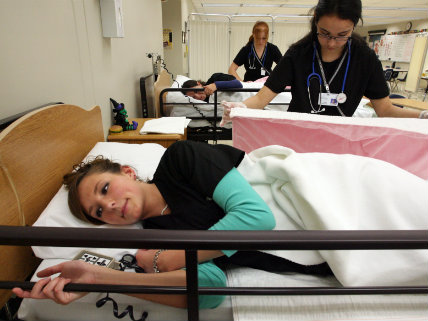How Two Florida Hospitals Used the Power of the State to Stop Another From Being Built
New report from Watchdog reveals how Florida's Certificate of Necessity laws limit competition and access to care.

North Port, Florida, has seen its population triple since the year 2000, and more people means more demand for medical care.
But when a healthcare provider, The Agency for Healthcare Administration, tried to build a hospital in the fast-growing suburb of Sarasota, two nearby hospitals joined forces—and used their influence in the state Department of Health—to block the effort.
It's yet another example of how state-level Certificate of Necessity laws limit the supply of medical care to the advantage of major hospital chains, leaving patients with fewer options and forced to pay higher prices. These CON licensing processes are supposed to balance the interests of hospitals with the needs of the public, but in reality they are fraught with politics and allow special interests to effectively veto unwanted competition.
A new report at Watchdog.org highlights how two established and politically connected hospitals in the Sarasota area worked together to block the new hospital in North Port, despite widespread community support for the new facility.
"The city delivered approximately 20,000 letters of support for a hospital along with a willing hospital partner to [the Agency for Health Care Administration] and applied for a certificate of need," Dr. Lee Gross, president of the Docs 4 Patient Care Foundation, a non-profit devoted to preserving patient choices and protecting health care freedom, told Watchdog.
After North Port's application was initially approved, the surrounding hospitals appealed the decision, and North Port's certificate of need for a hospital was rejected on appeal. Another application in 2016 also failed.
"That means patients in North Port must travel to Venice, Englewood, or Port Charlotte for the nearest hospital," writes Erin Clark, Watchdog's state reporter in Florida. "In many cases, North Port residents are looking at as much as an hour in the car to get to a hospital. With roads clogged by tourists and snowbirds, that can be even longer in the winter."
The lack of a hospital in North Port isn't good for anyone, but it's lucrative for the nearby hospitals that have been able to block the unwanted competition.
The story is the same in other places. Two hospital chains want to build a new facility in Brunswick County, North Carolina, but the state has decided that the rapidly growing county only "needs" one new hospital. Even one new hospital is too much for an existing nearby hospital, which is opposing both applications.
More than 30 states have CON laws on the books, and they can have disastrous real world consequences, as Reason recently highlighted in an investigation that showed how Virginia's CON laws played a role in the death of an infant.
Even as some states are wisely considering changes to CON laws to allow hospitals more freedom to expand and offer additional medical services, Florida seems to be moving in the opposite direction.
Watchdog reports that Florida subjected only 11 devices and services to CON requirements in 2011, but now has 17 CON restrictions—the state government gets to weigh-in whenever a new hospital wants to open, yes, but also whenever an existing hospital wants to buy a new CT scanner or add a neonatal intensive care unit. Research from the Mercatus Center, a free market think tank at George Mason University in Virginia, suggests that Floridians would have access to approximately 3,428 more hospital beds, 18 more hospitals that offer CT scans, and between five and 10 more hospitals offering MRI scans if the state didn't use CON laws to restrict the supply of medical services.
Virginia lawmakers tried (for the third year in a row) to reform their state's hospital licensing laws this year, but the bill failed to gain enough support.
A pair of bills to kill Florida's CON laws have been introduced this year, Watchdog reports.

Show Comments (28)